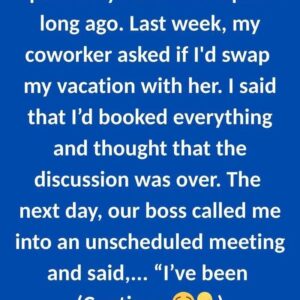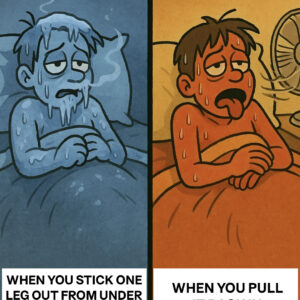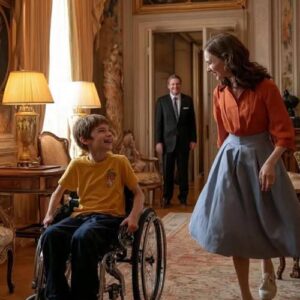
He’s always been the quiet kind.
The guy who fixes things without saying they’re broken. Who shows up to help move your furniture but never calls just to talk. His way of saying “I love you” has always been “Check your oil” or “I brought you some leftover ham.”
So when we moved him in after Mom passed, I didn’t expect much to change.
He wears the same slippers every day. Pulls his pants up higher than any human should. Shuffles around the house like he’s trying not to wake the floorboards.
But he laughs. Still laughs. Usually at himself. That never left him.
The other night, we were sitting in the kitchen. I had just reheated some soup for him, the kind Mom used to make, with potatoes and bits of bacon. I slid it across the table and he gave me this slow nod, the kind that’s not just “thank you,” but “I remember this.”
He took one bite, set the spoon down, and stared at me.
“You’re doing alright,” he said.
It came out soft, almost like he was testing the words for the first time.
I froze. That’s not something he says. Not to me, not to anyone.
I blinked. “What do you mean?”
He shrugged, like it wasn’t a big deal. “You’re doing alright. With the house. With me. With everything.”
And just like that, he went back to his soup.
I felt it like a punch to the chest. The good kind. The kind that knocks the air out of you because you didn’t know you needed to hear something until you heard it.
It wasn’t a grand declaration. But it was his version of standing on a mountaintop and shouting it to the world.
It got me thinking about all the years I’d tried to pull emotion out of him like teeth.
Growing up, I used to think my dad was a bit of a mystery. He didn’t say “I’m proud of you” when I brought home good grades. He didn’t hug me when I got dumped senior year. He just showed up to fix my broken bike or changed the tires on my car. He was always doing, never saying.
But in that one line—“You’re doing alright”—he told me more than I’d heard in years.
The next day, I found myself watching him a little closer.
He’d sit by the window in the mornings, cup of black coffee in hand, watching the birds like they were old friends. I asked him what he was thinking about.
“Those damn squirrels. Stealing the birdseed.”
Classic Dad. But his lips curled into a smirk, and I saw something behind his eyes. Something softer.
That week, I decided to do something different.
I asked him to come with me to the hardware store.
He hesitated. “What for?”
“Just looking for stuff,” I said. “Thought you might want to come along.”
He grumbled, but got up anyway. Put on his old windbreaker and baseball cap that hadn’t seen the light of day since 2009.
At the store, we didn’t say much. But as we stood in the aisle full of power tools, he suddenly reached out and picked up a wrench.
“This one’s no good,” he said.
I smiled. “Why not?”
He showed me. Pointed out the angle, the weight, the handle. I just listened.
It was the most he’d said all day.
And when we got home, he helped me fix the leaky faucet. Well—he fixed it, and I held the flashlight.
That night, I found him asleep in the recliner, an old photo album on his lap.
I didn’t even know he still had it.
Inside were pictures of Mom. Of us. A shot of me holding a popsicle, my front teeth missing, and him standing behind me, laughing.
The photo was yellowed, the edges curled.
I don’t know what came over me, but I took the album and sat next to him.
“Dad?” I whispered.
He blinked awake. “Huh?”
“Tell me about this one.”
He stared at the photo.
“You cried that day. You dropped your popsicle in the dirt. Wouldn’t stop crying. I picked it up, rinsed it, and gave it back.”
I laughed. “You gave me dirt-covered food?”
He smirked. “You stopped crying, didn’t you?”
We went through three more pages that night. He told me things I’d never heard before.
Like how he used to sing to Mom when she cooked. How he once drove six hours in a snowstorm because I forgot my science project at home.
“I never knew that,” I said.
“You weren’t supposed to,” he replied. “That was the point.”
A few days later, something happened. Something unexpected.
I came home from work, and the house was quiet. Too quiet.
“Dad?” I called.
No answer.
My stomach dropped.
I found him in the backyard, sitting on the old bench under the tree.
His eyes were closed.
I panicked—ran over, touched his shoulder.
He opened his eyes slowly.
“Just resting,” he said, voice raspy. “Tree’s still here.”
The tree. We planted it when I was ten. It was barely a twig back then.
He looked up at the branches.
“Your mom used to read under this tree.”
I sat down beside him.
He didn’t say anything else for a while. Just stared at the leaves.
“I’m sorry I didn’t say more,” he finally whispered.
“What do you mean?” I asked.
“Everything. When you were growing up. When your mom got sick. I didn’t know how. Still don’t, really.”
His eyes were wet.
I had never seen my father cry. Not once.
“It’s okay, Dad,” I said, putting my hand on his. “You said enough in your own way.”
He nodded, just once.
Then something strange happened.
He pulled something out of his pocket. A folded piece of paper.
“What’s that?” I asked.
He handed it to me.
Inside was a letter.
To me.
Written in his handwriting.
“I started it when your mom passed. Wasn’t sure when to give it to you. Figured… maybe now’s as good a time as any.”
I read it later that night.
He wrote about the early days with Mom. About how scared he was when I was born. How he used to peek into my room just to make sure I was breathing.
He wrote about how proud he was of me.
Every job I took. Every mistake I made. Every time I got back up.
And at the end, he wrote: “I might not always say it, but you made me proud to be a father.”
I sat there for a long time.
Cried harder than I had in years.
And that’s when I realized something.
My dad wasn’t just a man of few words.
He was a man who saved his words.
Stored them up.
And when he gave them to you, it meant something.
A few weeks later, I got a call from my cousin.
She asked if I’d be willing to come talk at her local community center—some kind of Father’s Day thing.
They were doing a night called “The Things My Dad Taught Me Without Saying a Word.”
I said yes.
When I stood up in front of that small crowd, I brought the letter with me.
I told them about the wrench at the hardware store. The photo album. The dirt-covered popsicle.
People laughed. Some cried.
Afterward, a man came up to me.
He was probably in his 50s, tough-looking guy, worn hands.
“My dad was like that too,” he said. “Never said much. But he showed up.”
And that’s it, isn’t it?
Not all love is loud.
Some of it is quiet, steady, and tucked inside acts so ordinary you almost miss them.
The next morning, I made Dad pancakes.
He looked at the plate, then at me.
“Too much syrup,” he said.
But he ate every bite.
We didn’t talk much after that.
We didn’t need to.
He’s still here. Still shuffling around in those slippers.
Still fixing things without being asked.
Still watching the squirrels steal the birdseed.
But now, every once in a while, he says something.
Little things.
Like “That color looks good on you,” or “That’s a good song,” or just “I’m glad you’re here.”
And every time he does, I treasure it.
Because when a quiet man speaks, it echoes longer.
And it fills the spaces you didn’t even know were empty.
So if you have someone in your life like that—someone who loves in quiet ways—don’t wait for the big words.
Listen to the little ones.
They’re just as loud if you know how to hear them.
And maybe… say something back. Even if it’s just, “Thanks for the leftover ham.”
Because love doesn’t always sound like music.
Sometimes, it sounds like a wrench in a drawer, or slippers on tile, or a soft chuckle at a bad joke.
And that’s enough.
If this story reminded you of someone, give it a like and share it with someone who needs to hear it.
Maybe your own quiet hero is still waiting for you to say, “I see you. And I love you too.”





